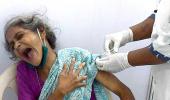'Vaccination is the only safe way to get immunity.'
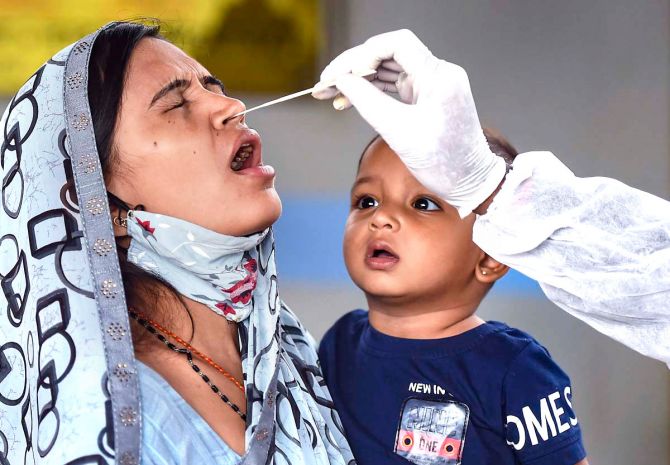
Some of us are sitting peacefully at home, rarely stepping out, and if we do, it's with our double masks on tight.
We are still mildly quarantining groceries and heating outside food.
Socialising? Not all.
Fun trips are out of question. So are visit to restaurants and malls.
And sometimes feeling foolish at our odd reclusive COVID-19-crafted tendencies.
Is that you?
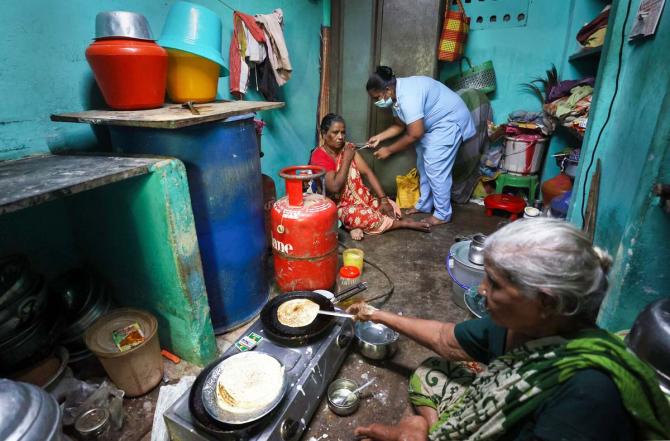
Some of us are roaming the country mask-less bindass, meeting up with multitudes of friends and partying Like It's 1999, never fearing that a more damaging version COVID-19 will catch up with us.
Is that you?
Some of us are motoring a careful, but not always rational, indecisive middle course between both extremes.
Is that you?
Are you the timid turtle or the gay grasshopper?
Or the middle-course dude?
Do you think another COVID-19 disaster won't come back to India in any majorly scary form?
And that the Third Wave may not happen?
Or do you seriously fear the future?
Dr Soumya Swaminathan, a senior Indian scientist working with the World Health Organiwation, Geneva, not long ago said COVID-19 -- which has astoundingly and nightmarishly sickened 228 million people globally and wiped out 4.6 million and counting -- might be becoming 'endemic' or here to stay, but handle-able because of reasonable levels of immunity, quite like the swine flu and bird flu did before it.
And more recently Dr Monica Gandhi, infectious disease specialist and professor of medicine at University of California San Francisco told The Washington Post: 'I truly, truly think we are in the endgame. The cases will start plummeting in mid- to late September and by mid-October, we will be in a manageable place, where the virus is a concern for health professionals, but not really for the general public'.
While she said this in reference to the US, and San Francisco specifically, her curiosity-sparking optimism can have implications elsewhere, as immunity levels rise, in India too, unfortunately drastically -- though public health figures are not testifying that for various reasons that cannot always be delved into -- after the tragic second wave and with the momentum of the vaccination drive.
Dr Gandhi teaches medicine and is also the associate division chief of the division of HIV, Infectious Diseases, and Global Medicine at UCSF/ San Francisco General Hospital.
Trained at Harvard Medical School and UCSF in internal medicine and infectious diseases with a specialisation in HIV, she also earned her masters from Berkeley in public health with a focus on epidemiology and biostatistics.
While HIV care is the main emphasis of Dr Gandhi's work, in COVID-19 times she has turned her attention to patterns of transmission of the SARS-CoV-2, the germ responsible for this cataclysmic catastrophe, including by asymptomatic carriers, and also on the endgame for the virus.
Interestingly, the infectious disease specialist's pandemic work tossed up the discovery that indicated that masks, which filter 95 per cent particles if an N-95, can also critically reduce viral load. That is, if you should come in touch too closely with someone sick with COVID-19 and the 5 per cent error factor allowed those toxic viral particles to penetrate your mask, you will get a lesser load.
In this multi-part interview, Dr Gandhi tells Vaihayasi Pande Daniel/Rediff.com, "When people say: Well, why is it taking so long (for COVID-19 to go)? I mean it takes a long time for 7 billion people (across the world) to develop immunity to this virus. We are not working on that global vaccine equity fast enough."
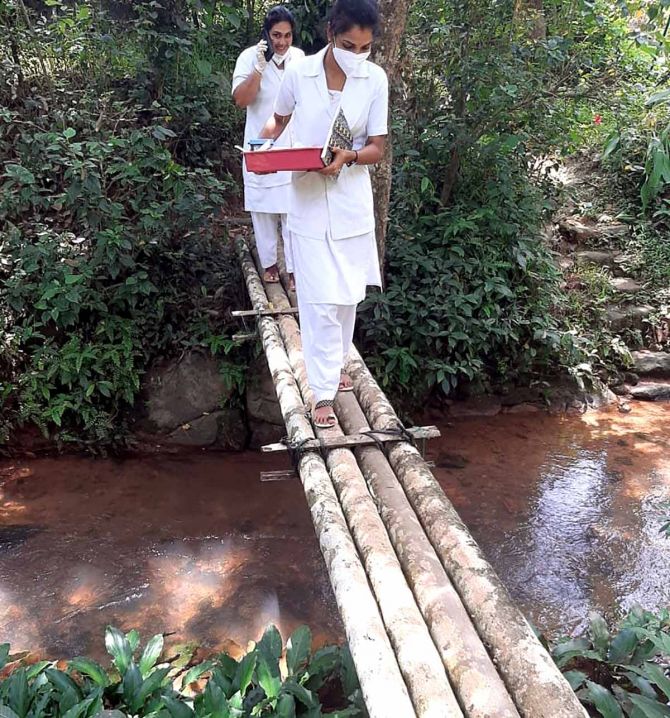
You told The Washington Post, September 4, that, at least in America the endgame for COVID-19 could be as soon as September or October.
Do you still feel that and why? And did you say that because you've felt that the virus is becoming endemic, like the flu?
Let me explain what I meant by that.
I think endgame is probably the wrong word.
To be fair, there is this question of the virus becoming endemic, right?
It's not even a question. I don't think anyone now thinks we're going to -- with such a transmissible variant like Delta around, that's so contagious - (entirely) eliminate COVID-19. Unfortunately.
What I was describing was (in the context of) places with high immunity.
And what do I mean by places with high immunity?
Well, San Francisco is a good example. We now have low transmission, because we have 79 per cent first vaccination rate.
Or Denmark, which has 80 per cent first vaccination rate, has fully opened as of this week.
The UK, of course, opened maybe early, but they opened on July 19.
And then Ireland has opened or is going to open on September 22.
All of these places have high levels of immunity.
What they have determined is that even with such a transmissible variant, they're going to live with the virus, in this endemic state. The thing about Delta is what it did and is doing - but it's not finished yet, certainly not in the US at all -- is that it's causing high levels of immunity.
In some cases, like the (American) South where people are still declining to get vaccinated, it's very unfortunately causing high levels of immunity through natural infection.
Missouri's cases (some of the worst in the US) are also coming down now for the last three weeks. Unfortunately, it had nothing to do with masks or social distancing. It was all natural immunity, because so many people got infected.
Such a transmissible variant, in a way, profoundly enhances immunity. In some cases, giving already vaccinated people exposure, which hopefully will be mild. Or asymptomatic. And giving uninfected people the infection. That will lead to higher and higher rates of immunity, which will bring us to the endemic state.
I'm not saying that that's ever how I would have wanted it to happen. Again, vaccination is the only safe way to get immunity.
Sadly, in our country, here in the US, we have a lot of lack of vaccine uptake (vaccine hesitancy) and among developed countries it is the lowest. It is terrible.
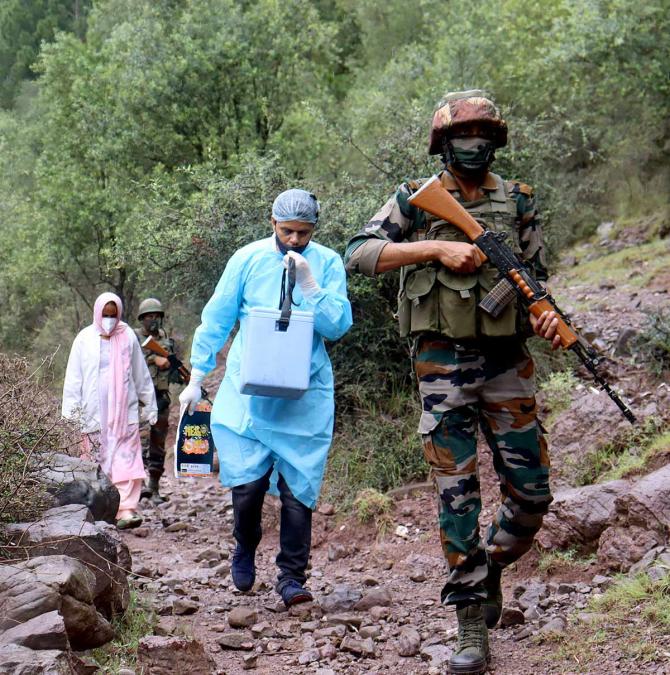
When you say it could be coming endemic, are you saying imminently or still some months down the road?
That's a great question. It actually completely depends on the level of immunity that you started out with.
In the United States as a whole, it's going to be some months, because -- you can see it - it's coming down slowly in places that are getting there (mainly) through natural immunity.
In places like San Francisco, we had a very quick rise, and then we had a very quick decrease. We're now down, as of this morning, to low rates of transmission -- less than 10 cases in over 100,000 people, less than 5 per cent test positivity rates and 80 per cent first vaccination rates.
Vermont, for instance, never really suffered that Delta surge because they had 80 per cent vaccination rate when it hit.
Everything is going to depend on the place (point) where you started from when Delta hit your country.
If you are at 4 per cent vaccination rate like India was then (when the second wave hit), case rates did come down. But it came down through terrible death and suffering.
When the Delta variant hit the UK, there was 76 per cent first vaccination rate and lots and lots of cases. But hospitalisations remained relatively lower. And they made the decision on July 19, to open, anyway.
And then in Denmark there were a lot of cases, and the vaccination rate wasn't as high. But then they got their vaccination up really quickly. And then (case rates) went down quickly.
Everything is dependent on your baseline level of immunity when the terrible Delta variant hits.
In the 50 US states, it's going to be variable.
But yes, immunity will get us through it, just like it got us through the 1918 flu pandemic, again through terrible death and suffering there, because there was no vaccine. A very transmissible variable will give much, much higher levels of immunity in the population and they will fundamentally break the infection down.
That is all I was talking about.
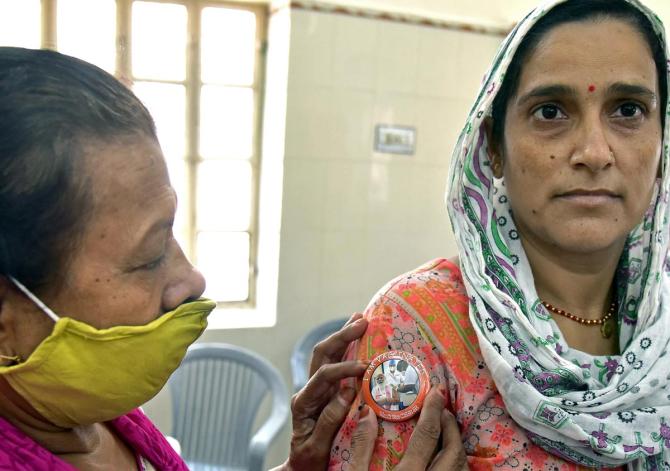
And when is that date for various places?
Well, it's September in San Francisco.
The (epidemiological) models in the United States, at least a model from the UCSF department of epidemiology, where I am, showed that cases will start to decrease in the United States, mid-September. The model had shown that and that is generally true.
As of this last weekend, overall, the cases have started to decrease across the entire United States, with Ohio in the upper Midwest being the only place where we're still worried because they have less immunity of both the vaccination and natural (varieties). So, I'm worried about the Midwest still taking a while.
Everywhere else, our cases started declining, just like the models predicted, in mid-September.
And then how long will it take for those cases to come down so that it becomes endemic, where we can tolerate it?
I will say that likely, again, it's going to depend on each state's level of immunity to start with. But yes, I think that the Delta variant put us in a position to get higher levels of immunity to get to endemicity (quicker).
And what will endemicity look like?
Well, in places where adults still decline to vaccinate, they will be susceptible to severe disease. There'll be outbreaks of severe disease.
In general, elsewhere, hopefully, it will become a circulating respiratory virus that doesn't do the harm that it did, because of vaccination. And because of the ability of vaccination to protect us from severe disease.
That is, all told, what I was saying about the Delta variant: It almost hastened things, in a way, because of its high transmissibility, and the way it is ravaging through the population.
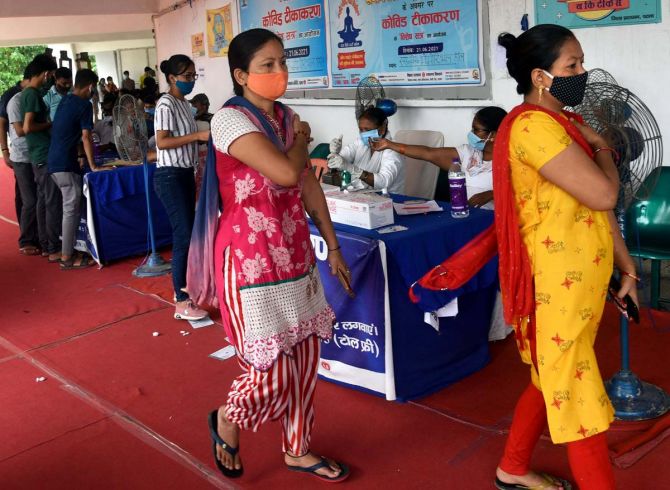
Basically, you're saying that COVID-19 will become endemic in a patchy way, in each place/country, because it'll be according to the trends in that geographical area and its baseline immunity.
Therefore, one can talk of a general figure, but there will also be patchiness in the way COVID-19 will become endemic, like flu did, depending on how people behave and how people take/get access to their vaccines?
Exactly. Exactly right.
For instance, New Zealand is a place that has kept a lot of restrictions. They will take longer, in a way because they have to get very, very high levels of vaccination immunity.
Whereas in a place like the UK, that had higher rates of infection, like the US, got more immunity quicker.
The US and the UK were kind of outlier nations (among) developed countries, because they really didn't keep restrictions to the same degree. So, they had higher rates of cases, higher rates of natural immunity.
This hit us so hard, because we just didn't have immunity to this coronavirus. When people say: Well, why is it taking so long (for COVID-19 to go)?
I mean it takes a long time for 7 billion people (across the world) to develop immunity to this virus.
We are not working on that global vaccine equity fast enough, at all, which is what WHO is very fairly pointing out to us.
Because of that, in other places (getting now hit by Delta), till we get to global vaccine equity, it'll take even longer.
Though, again, when Delta hits, like it happened in India (during the second wave), a lot of natural immunity resulted, unfortunately, and then vaccination rates in India picked up after that.
 IMAGE: Dr Monica Gandhi. Photograph: Kind courtesy Dr Monica Gandhi
IMAGE: Dr Monica Gandhi. Photograph: Kind courtesy Dr Monica GandhiI had planned to ask you that. There can be no endgame for the US, unless there is endgame elsewhere in the world.
Even if -- according to what you're saying, very logically, COVID-19 is going to become endemic -- if the rest of the world is still lagging behind, and there is a lot of spread and new variants happen, that will catch up with America as well.
Absolutely. Absolutely.
There is nothing more important that I can think of than vaccinating the world. I think it's profoundly short sighted of rich countries to not make this their number one priority, which they have not -- to help vaccinate the world.
Vaccine equity is even more important because a country or a population of people may party its way, precaution-less, through a holiday season, even in areas where general immunity levels are poor and produce some new horribly more lethal variant, like the way Delta arose.
And that variant will creep its way across the world and to America, just when the endgame might be happening in states like Vermont and upset the apple cart?
You're exactly right.
Feature Presentation: Ashish Narsale/Rediff.com



